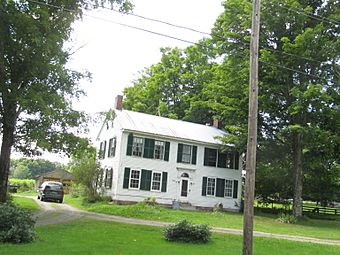Hardwick Street Historic District facts for kids
Quick facts for kids |
|
|
Hardwick Street Historic District
|
|
 |
|
| Location | Hardwick Street and Bayley-Hazen Road, Hardwick, Vermont |
|---|---|
| Area | 120 acres (49 ha) |
| Architectural style | Greek Revival, Federal |
| NRHP reference No. | 79000321 |
| Added to NRHP | June 22, 1979 |
The Hardwick Street Historic District is a special area in Hardwick, Vermont. It shows where the town first began. This district includes old farm properties from the early 1800s. You can find it along Hardwick Street and Bayley-Hazen Road. This historic place was added to the National Register of Historic Places in 1979.
Contents
Discovering Hardwick's Past
The town of Hardwick was first settled in 1793. A man named Asa Warner was the first to arrive. He traveled along the Bayley-Hazen Military Road. This road was built during the American Revolutionary War. Soldiers from the Continental Army built it. They hoped to use it to attack the British in Quebec.
The Military Road's Legacy
The Bayley-Hazen Road was never used for fighting. But it was very important for Vermont. It helped open up the northern part of the state. This allowed people to move there and start new towns. Asa Warner settled in eastern Hardwick. His home was on a part of Hardwick Street that was once the old military road. He ran an inn and a place for stagecoaches.
Early Life in Hardwick
Other settlers soon followed Asa Warner. By 1810, the area had grown. It had a post office and a general store. That old store building is now a private home. After the American Civil War, the area changed. Other parts of Hardwick became more important for business and town life.
Exploring the District
The historic district covers a section of Hardwick Street. It runs from Country Club Road to the Bayley-Hazen Road. It also goes along Bayley-Hazen Road to the Hazen Road Cemetery. Many of the first settlers are buried there. The old buildings in the district are mostly made of wood. They are usually 1-1/2 or 2-1/2 stories tall. Most were built between 1810 and 1855.
There is also a stone marker in the district. A local group called the Grange placed it in 1906. It helps remember the history of the old military road.



